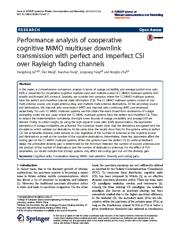A copy of this work was available on the public web and has been preserved in the Wayback Machine. The capture dates from 2017; you can also visit the original URL.
The file type is application/pdf.
Performance analysis of cooperative cognitive MIMO multiuser downlink transmission with perfect and imperfect CSI over Rayleigh fading channels
2015
EURASIP Journal on Wireless Communications and Networking
In this paper, a comprehensive comparison analysis in terms of outage probability and average symbol error ratio (SER) is presented for cooperative cognitive multiple-input and multiple-output (CC-MIMO) multiuser systems with amplify-and-forward (AF) protocol. Specially, we consider two scenarios where the CC-MIMO multiuser systems have the perfect and imperfect channel state information (CSI). The CC-MIMO multiuser systems consist of one multi-antenna source, one single-antenna relay, and
doi:10.1186/s13638-015-0431-1
fatcat:4v3nbismabdrvpp4z5uzcgqczq

